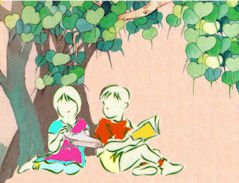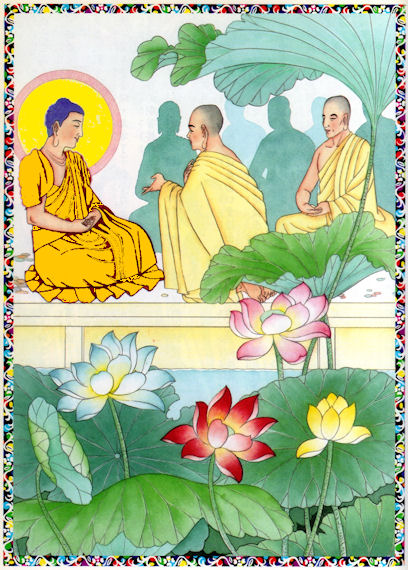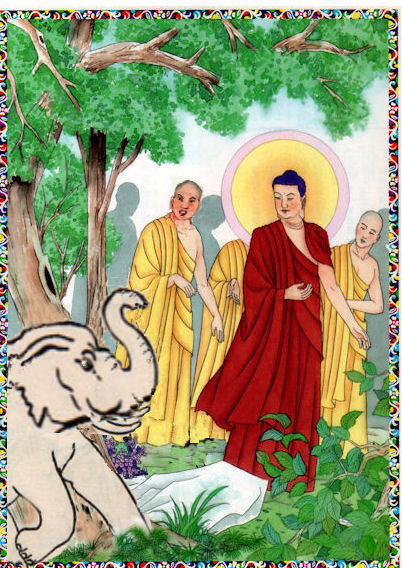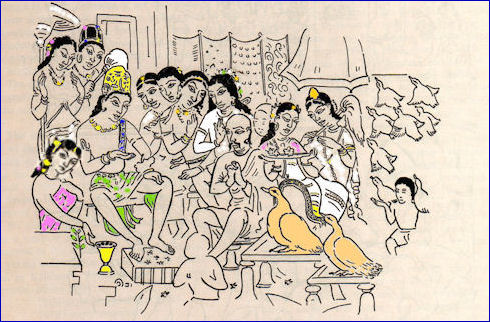



The Jataka Story of the Golden Swans

The Jataka Story of the Golden Swans

Once, long long ago, it is said that the Bodhisattva was born as the king of the swans. He was at the head of a very large tribe and lived with his subjects on a wonderful lake of Cittakuta, which is supposed to on the mountain Kailasa in the Himalayas.
The name of the Bodhisattva, as he was the king of the swans, was Dhatarattha and his Commander-in Chief was called Sumukha.
The king and his friends were very much superior to the other swans and both used to teach the tribe, as a teacher and his best disciple teach the younger children. Thus, carefully taught, the whole tribe of swans became famous through the whole land on account of their peaceful and just behavior towards all other birds and animals.
The lake on which they dwelt was exceedingly beautiful. Flowering trees, which reflected their beauty in the clear waters of the lake, surrounded its border, and pink and blue lotuses peeped out of the water, resting on their green leaves like the sweet smiling face of a child on its cushion. Here operated the swans in groups or in a mass together, looking like snow-white clouds on the blue sky.
The two leaders of these swans looked so majestic, when they were at the head of their flock, or when they were teaching, that their fame spread everywhere and it was said that they had only shape of swans, but must in reality be human beings.
At this time there lived in Banares a king with the name of Sakula. He had heard his people talked about the two wonderful swans, who lived with their tribe of swans on the magnificent lake of Cittakuta. He became very curious to see these two birds and asked his ministers to make a plan, so that he could see at least these two swans. The ministers answered the king that there were only one possibility of getting a sight of the swans and that was if the king would have a lake constructed, which would surpass in beauty even the lake of Cittakuta. Then, they thought, the swans might be induced to leave their present abode and come to live on the king's lake.
The king was pleased with this proposal and he at once ordered that in one of the forests, not too far from his capital, a magnificient lake should be made.
So a pond was widened and deepened, and water lilies and lotus began to bloom in the new lake, flowering bushes and trees smiled at their reflections in the clear water and strewed pollen of their flowers like a carpet on its borders. And it was called Manusiya Lake.
Fishes sported in the water. Elephants, delighting in the clearness and freshness of the water, dipped their trunks into it and bathed their huge bodies, with cascades od spray which fell like silver pearls in to the lake. In the nights the moon and the stars shone upon the clear lake and there was not its equal anywhere.
Everyday a tom-tom beater proclaimed that king Sakula was pleased to give this lake, with all it contained and the land surrounding it, as a present to all birds, to whom he granted perfect safety.
So the birds came, cranes and flamingos and other water birds, and the little singing-birds filled the branches of trees, which stood on the shores of the lake. Bees hummed over the flowers, and peacocks spread their tails and danced in delight around the lake and pheasants peeped through the bushes and all was peace and happiness. No fowler or fisherman came near.
"But where are the wonderful swans, for whom I had this fair lake created?" said king Sakula one day, when he looked at the lake and saw many birds, but not any swans. "They will come," answered the ministers, " a little later in the season, when they are accustomed to fly about."
So the king waited.
One day when the rain clouds had disappeared from the dark sky, and when the earth and the lake Cittakuta smiled in beauty and radiance, some pairs of young swans from the tribe of the Bodhisattva lifted themselves on their wings for a long flight. They passed over towns and forests and there they saw in a beautiful valley, surrounded by lovely trees, a glittering sheet of water.
"Let us have a swim on that lake, which looks as lovely as our own home," said one swan, and all of them alighted.
To their surprise they found all kinds of water birds on this lake, but no swans, and looking around they saw the sal, kadamba, the arjiena and keteka trees full of merry singing birds. They saw peacocks and pheasants, and all were happy and content and no fear disturbed their innocent pleasures. They were so delighted with all they saw, that they wishes that all their friend could enjoy the beautiful lake too.
They remained for some time there so that they might tell their friends all they saw and induced their king to come here with the whole flock. They themselves heard by the tom-tom proclamation that there was safety for all birds on and around the lake and that made them happy.
The swans remained till the beginning of the rainy season and when the sky for the first time filled with clouds, and the lightning began to flash, gilding the gray clouds with sudden beauty; when the thunder just rolled gently in the distance and the fresh winds began to blow, the swans flew back to their home and their own tribe.
They were full of news when they saw their companions, and they gave such a glorious description of the lake constructed by the king Sakula, that their king Dhatarattha heard about it.
So they were called before him and after they had described the beauty of the lake they had dwelt on for the short time, and told how all birds had freedom there and were protected by the proclamation of king Sakula, all the swans were anxious to go there after the rainy season should be over.
But the king turned to his wise counselor Sumukha and asked for his advice in this affair. And Sumukha shook his head and said: "Your Majesty, I do not trust man, and I fear that the beauty of this lake has been created as a trap for Your Majesty. All this long time past there was no such lake there. Also, birds and animals express their true feelings by their cries, but men are the only animals who disguise their feelings by saying something different from what they really mean. If the excursion to this new lake has to be made, then I would advise that we stay only for a short time and do not take up our residence there altogether."
The swans were not satisfied with these words and they requested their king again and again to take them to the beautiful lake near Benares and to remain there. At last the king of the swans consented to an excursion to the much talked of lake, and one full-moon night Dhatarattha and Sumukha, at the head of the flock of swans from the Cittakuta lake, began their flight toward Benares. Arrived at the lake Manusiya all were delighted with it and in a short time most of the swans had almost forgotten their home and they were happy and content on the new lake with its beautiful surroundings. They had heard the proclamation of safety and they believed themselves in a haven of rest and security.
But the guardians of the lake reported to king Sakula that a number of swans had arrived and that two of them shone out in beauty and size among them so they thought that these must be the very swans whom the king wanted to see.
When king Sakula heard this he was very glad and he called the best of his fowlers and asked him to catch these two great swans. The fowler watched the two leaders to the swans, and in those places which they most frequented he set some strong snares, which were to catch their feet, when they were swimming about.
Not suspecting anything and trusting the words of the king's proclamation the Bodhisattva and his friends were enjoying themselves among the lotuses of the lake, when the foot of Dhatarattha got entangled in a snare. In order to warn the other swans of danger, he announced by a certain cry that he had been caught and the swans with a cry of terror flew up into the air. Only Sumukha stayed at the side of his Master and would not move.
The Bodhisattva urged his friend to leave him as he could not help him, but Sumukha answered: "Whatever thy fate is, my Master, that shall be mine also. I always attend on thee in thy prosperity and I will not leave thee in thy distress." The bodhisattva answered: "My fate will be in the kitchen, as is the fate of birds ensnared. Why should you follow me there? And what advantage will there be of death of both of us?"
Sumukha answered: "The law of Righteousness teaches that one may not leave one's friend in distress, even for the sake of saving one's own life!" "That you have proved" answered the Bodhisattva "and therefore, I give you leave now to fly away. Besides you must fill my place in my kingdom, as you are wise."
While they thus talking with each other, the fowler came and, seeing that all of the swans had flown away except two, he thought at once that they must have been caught, so he rushed on them like father Death himself.
When he found out that only one was caught and the other stayed with him on his own free will, he was very astonished and he said to Sumukha: "I wonder why this bird, which has his liberty does not use it to fly away?" To the astonishment of the fowler the swan answered: "How is it that thou wonderest that I do not fly away at thy approach, although I am not snared like my companion who is in thy power? Dost thou not know that his virtue had bound my heart to him with stronger ties than thy snares have bound his foot?"
Full of admiration the fowler said: "What is this bird to thee? All the other swans have fled, but thou remainest?" Sumukha replied: "He is my king, my friend, whom I love more than my own life. How could I leave him, when he is in distress?"
The fowler was touched by the words he heard and he said: "I did not catch you for myself, I was employed by Sakula, king of Benares. I do not want both of you, so fly away and join your relations."
Sumukha answered: "If you want only one of us, take me. Our bodies are almost alike and our age is the same. Set my king free and take me instead of him and thus thou wilt not lose thy profit. Tie me ere thou loosest the king, if thou dost not trust me, and thus thou wilt be sure of me. The gratitude of all the swans will be thine, if they see their beloved king come back to them."
The fowler, although accustomed to his cruel business, was so touched by the love manifested by the one bird for the other that, forgetting the order of the the king to catch these swans, he said, lifting his hands in homage to the birds: "If such faithfulness were shown among men, it would be called a wonder. I must pay my reverence to thee, for how could I be cruel to the one for whom thou art willing to give thine own life? I will set thy Master free."
With these words, the fowler, asking the pardon of the Bodhisattva for ensnaring him, untied the snare.
With a grateful look at the man, Sumukha said: "Mayest thou, who hast gladdened my heart by the releasing of the king of the swans, be happy with thy relatives and friends for a thousands of years to come. But in order not to be punished by the king, take both of us to him and show us to him, carrying us untied in two open baskets. The king surely will reward thee with a rich gift."
After some hesitation the fowler took the two famous swans to king Sakula, who was delighted to see them and who was astonished at their beauty and wondered why they suffered themselves to be brought to him untied and unhurt. Then the fowler told the king the whole story, and how he was so overcome by the human words of the bird and by his willingness to sacrifice himself for his master that he set him free.
"Out of gratitude" continued the fowler, "the swan proposed that I should take him and his companion to you, so that I might get a reward for my trouble. whoever they might be, under the shape of swans, they must be great human beings, that they can move me to such tenderness, cruel and coarse man that I am."
The king could hardly believe his ears, and with great joy he had a golden throne erected for the Bodhisattva nd a bamboo seat for his minister. Then the Bodhisattva, with the voice as sweet as the evening breeze, said to the king: "Thy mind and body are healthy, king, are they not? Thou art compassionate and just, thou art prosperous, thou lovest thy religion and thy subjects, and thou art a hero of much courage. What is thy wish now?"
The king answered: "My happiness is now completed, as I have had the gladness of seeing your holy persons. But tell me, did the fowler hurt Thee by his snares?"
The swan answered: "The fowler has not hurt me with his snare nor with his words. May our arrival bring him happiness, as it has brought happiness to Thee, O King!"
During the whole night the king of the swans conversed with king Sakula and the wise swan Sumukha also had his say.
Delighted with all the advice he received, the king listened. And when at dawn the golden swan said that he must now return to his mourning subjects, king Sakula, although filled with grief, allowed both of the fair creatures to depart.
The fowler of course, became rich through the gifts of the king and he never again ensnared birds.
Once more the Bodhisattva returned to king Sakula with his faithful friend Sumukha, bringing the whole company of swans with him, thus showing their gratitude to the king for releasing their Master. Then the swan taught the Law of Righteousness to king Sakula, who honored the Bodhisattva in return by bowing low and by following the Path of Righteousness.
The Buddha ended the story and identified the Birth: "At that time the fowler was Channa, the king was Sariputra, Sumukha was Ananda, and the king of the swan was I myself."
*This is drawn from the Jatakamala. More details concerning the story can be found in Culahamsa and Mahahamsa Jatakas, No. 533 & 534. In these stories, the Master, while residing in the Bamboo Grove, Veluvana, told the assembly of monks about the dedication of Ananda, who refused to step aside and insited on protecting the Buddha when the Buddha was facing the drunken elephant Nalagiri, a fierce and savage animal, on the city road of Rajagrha.